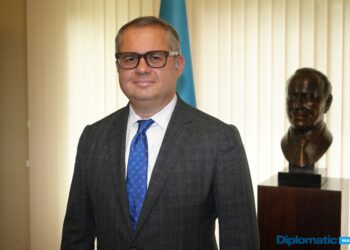Diplomatic Watch Magazine met with Robin Leeds in Washington, D.C. to discuss her remarkable career. As CEO of Winning Strategies LLC, a Partner at Democracy Partners, and a Presidential Appointee to the President’s Advisory Committee on the Arts, Robin has spent nearly four decades advocating for social justice and expanding American democracy. Her roles advising presidential campaigns, shaping public policy, and leading communications efforts for various organizations have had a significant impact. Her dedication to addressing inequality and empowering underrepresented communities stands out in her work, from her early activism to contributions to democratic reform. This interview delves into Robin’s journey, offering insight into her experiences and milestones that define her legacy in driving social change.
As we explore the intersection of social justice and international relations, can you walk us through your formative experiences in activism that shaped your perspective on global issues and diplomacy?
I started working in the social justice space in high school. I organized students around women’s rights, civil rights, and voting rights. My commitment to equality led me to pursue two independent studies in high school in New Jersey. One project focused on the role of women in the anti-apartheid movement in South Africa. I worked with the Committee for a Free South Africa, which sharpened my organizing and advocacy skills.
At 16, I also became involved in women’s health and reproductive justice, working with the “Our Bodies, Ourselves Collective,” which empowered women by raising awareness of women’s sexuality and health.
What aspect of social justice drove your passion early on, and why the focus on South Africa?
I was deeply focused on empowering young women to control their futures. In high school, I was also involved in the civil rights movement, traveling to New York for rallies and demonstrations. This opened my eyes to the global nature of these issues, connecting me to the anti-apartheid movement in South Africa and other domestic and global social movements.
Your career spans both activism and advocacy. How do these intersect?
My motto is “see something, say something, do something.” It guides my life. The historical significance of my birthday—May 17, 1954, the day of the Brown v. Board of Education decision—has always reinforced my mission. My work combines politics, policy, and communication, with each element playing a role in driving social change.
Winning Strategies integrates politics, policy, and communications. How do these elements come together in your work, especially in global affairs?
Every issue involves politics, communications, and organizing. Politics is about moving an agenda, communications is about creating and amplifying a unifying message, and organizing is about mobilizing people to take action. Without political power, we can’t effect change. It’s about having a clear strategy, mobilizing people around it, and measuring outcomes.

You’ve been described as someone who “makes Presidents, Governors, and Congresspeople.” Is that accurate?
In a way, but as part of a larger electoral movement. But it’s not just about getting people elected; it’s about holding them accountable. I work with candidates who are committed to a policy agenda that makes a real difference. It’s a kind of social contract. I don’t work with just anyone, I want to ensure a commitment to measurable outcomes within a social justice framework.
How do you ensure accountability?
It’s about establishing a social contract between leaders and their constituencies. For example, I worked with the Building Trades which has not historically prioritized diversity, equity, and inclusion. Over time, we helped them see the strength in inclusive long-term systemic change focused on reshaping power dynamics.
How do you navigate the polarized political environment when advocating for social justice?
I’m strategic and diplomatic, but I don’t back down easily. I fight for what I believe in and work in the trenches, not just shouting from the sidelines. I build long-term relationships based on trust and delivering results. You have to account for your successes and meet your goals. It’s about choosing your battles and knowing when to push and when to step back. The bottom line is to protect your seat at the table and to keep lines of communication open.
Many entities are involved in the current presidential campaign – the White House, the campaign, the DNC, and other party committees and stakeholders. Although challenging at times, I work to break down silos to create a unified strategy ensuring that people communicate effectively around a common agenda.
Do you work internationally as well?
Yes. I worked with the Clinton-Bush Haiti Recovery Commission during the earthquake, and served as a Vital Voices Global Ambassador supporting women leaders in Puerto Rico after Hurricane Maria. I collaborate with the Italian Embassy to the US in my role on the President’s Advisory Committee on the Arts, working on diverse public arts projects.
How did you become involved with the President’s Advisory Committee on the Arts, and what significance does this role have for you?
I was appointed because of my work in the social impact and arts space and my support of the Biden Administration’s arts and culture agenda. One of the most meaningful projects is the creation of the first-ever social impact endowment fund at the Kennedy Center, which will support social impact programming in perpetuity.









